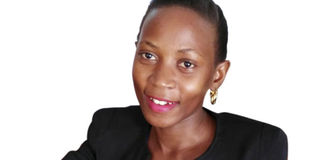Nabukenya uses her HIV-positive status to empower children

Josephine Nabukenya during the interview. PHOTO BY EDGAR R. BATTE
She wears a warm smile which lights up her small cute face as she extends her hand to say hello. Calmness is part of her demeanour. When we are settled, she shares her story of resilience, patience and strength.
For a better part of her childhood, Josephine Nabukenya watched her mother, Margaret Lubega, battle with illness. One day, she decided to go to Mulago National Referral Hospital where she asked to be tested.
The results confirmed Lubega had HIV/Aids. As is norm, she was encouraged to take family members for testing too. Nabukenya, her sisters and their father were taken. She was too young to realise what was taking place. She recalls going to Mulago hospital and playing with children she found there as they shared cake and soft drinks.
New dawn
Years later, one morning in 2001, Nabukenya walked into her mother’s room to tide it up. As she went about cleaning up, she landed on testimonies under her mother’s pillow. She had detailed her ordeal of living with HIV/Aids. It occurred to Nabukenya that she was positive.
“I kept quiet about it. Later on, my mother disclosed to me that I was HIV positive and as she broke the news, I saved her the trouble. I told her that I already knew my status because I had read her testimonies. She sighed with relief,” Nabukenya recounts. Her mother corroborates this.
At school she had learnt that HIV/Aids did not have a cure. In 2002, she would hear neighbours and visitors whisper to each other that her mother was going to die. Her mother was once pronounced dead yet she was still alive.
During emotional distress, an idea occurred to her. She started Young General Alive (YGA), an organisation that initially constituted Lubega, another mother and her child and another patient they had met at Mulago hospital during a visit. “We would meet, share a meal and play. In 2005, Makerere University - Johns Hopkins University Research Collaboration (Mujhu) helped us formalise our group,” mother and daughter, recount.
Mujhu was founded by clinical researchers interested in finding ways to prevent HIV infection in children and dedicated to improving the health of women, children, and families who are infected and affected by HIV/Aids.
Nabukenya is a youth programme coordinator. Meanwhile, YGA’s membership has since grown from seven to 207 members. They meet every second Saturday of the month to engage in school and community outreaches projects, fund-raising events such as car washes and outings, farming, sports, music, dance and drama.
Reaching out
She is also ambassador of Elizabeth Glaser Paediatric Aids Foundation (EGPAF). “During outreaches, I share my story with other children and help them with challenges such as disclosure, adherence, stigma and discrimination.”
In 2005, under EGPAF, she represented children both infected and affected by HIV/aids in the US congress. She also conducts different sessions when they meet both in YGA and Ariel groups, peer support group for children and adolescents.
YGA trains 10 adolescents annually, who preach key information about HIV/Aids. YGA has been to Namugongo Fund for special children, Mildmay in Lweza and Taso Entebbe.
The car-wash activations are held at the Mujhu premises and community where they raise Shs300, 000 on average.
They have had partnerships with interns from the US who join in their activities. The proceeds are saved and used to help members with financial challenges to attain education. Nabukenya says they aspire to organise bigger events to raise more funds to benefit more people. From the funds, they have been able to start a farm to grow crops which can be sold to benefit members. They grow maize and bananas and have a greenhouse under which they grow tomatoes and sweet pepper.
Winning the award
It is through championing such initiatives in addition to counselling people living with HIV/Aids and addressing conferences themed on HIV/Aids as she shares her story that got Nabukenya to win the Elizabeth Glaser Paediatric Aids Foundation 2016 Queen’s Young Leader Award.
She received it on Thursday in London. The Queen’s Young Leader Award recognises and celebrates exceptional people aged 18-29 from across the Commonwealth, who are taking the lead in their communities and using their skills to transform lives.
Winners of this prestigious award have received a unique package of training, mentoring and networking, including a one-week residential programme in the UK during which they collect their Award from Her Majesty the Queen. Nabukenya is the only person to receive the Queen’s Young Leader Award in Uganda this year. She travelled to London on June 16 for the official awarding ceremony.
Speaking about the award, she said it was a tightly contested one. “There were over 2, 000 contenders and only 60 were nominated,” she explains. Joy Edith Angulo, a Gender- Based Violence adviser at Usaid/RHITES-SW Project under EGPAF, nominated her.
How she came to be
Angulo has known Nabukenya for 11 years. “This was through my job with EGPAF – a Usaid funded organisation which supports children affected and infected by HIV/Aids. Josephine had just known about her HIV status. She was struggling with HIV-related stigma and discrimination,” she says. Adding that through the Ariel children’s club and Ariel adolescents’ holiday camp Josephine with other children from Mujhu and other parts of Uganda were equipped with knowledge and skills on how to cope and live positively with HIV.
“She was one of the young leaders who grew from being timid to a resilient and powerful young leader who encourages other children to live positively and take their drugs.




